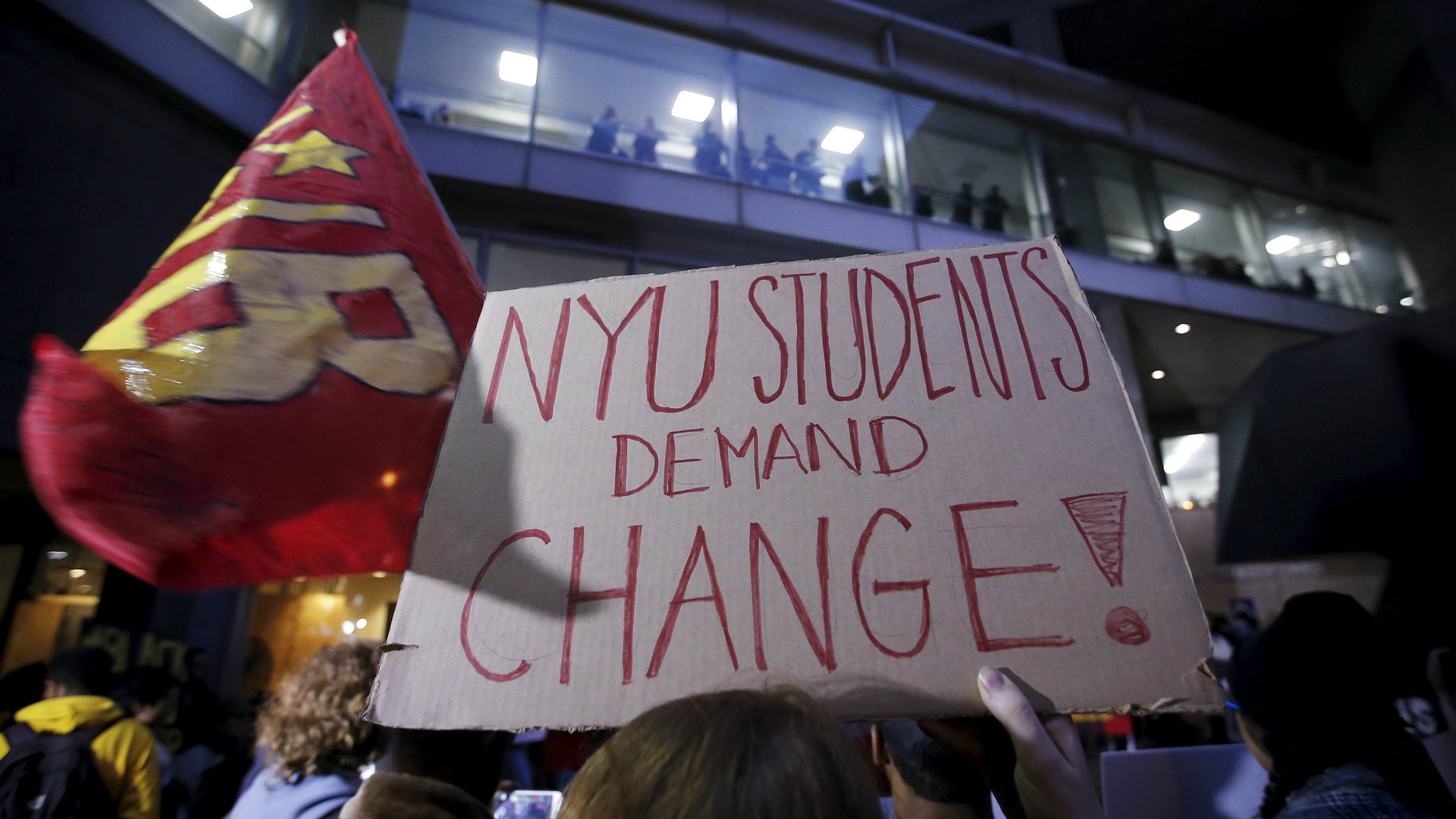A simple way to make America’s trillion-dollar student loan system more sane
American higher education holds great promise: Thanks to easy-to-obtain loans, students can spend years studying just about whatever they want. But there’s a catch—bankruptcy rules make it almost impossible to default on these loans when students get in over their heads. Given spiraling tuition costs, this leaves millions of people deep in debt for decades, if not their entire lives.


American higher education holds great promise: Thanks to easy-to-obtain loans, students can spend years studying just about whatever they want. But there’s a catch—bankruptcy rules make it almost impossible to default on these loans when students get in over their heads. Given spiraling tuition costs, this leaves millions of people deep in debt for decades, if not their entire lives.
The winners from this system include colleges that rake in the tuition, and the financial institutions that collect interest for decades. Those who are able to invest in their education do so in the expectation that the training and degree will allow them to earn more in their careers.
But as the debt piles up, society as a whole is losing out. Far too many people with crushing student debt loads can’t afford to start a family and buy a home. And despite some $1.5 trillion of student borrowing, employers consistently complain about a shortage of graduates with the skills they’re seeking.
What if there was a better way? More defaults could help. Student loans are generally bulletproof for creditors because debtors can seldom write off this kind of debt, even in bankruptcy.
In this sense, student debt rules are far more stringent than rules for other kinds of debt. Homeowners can walk away from unsustainable mortgages, and Silicon Valley entrepreneurs embracing a “fail fast” philosophy can move on from their failures. (US president Donald Trump has filed for bankruptcy multiple times, which he describes as a savvy business strategy.)
Making it easier to default on student debt could help rebalance this market: Instead of piling all the financial risk on inexperienced borrowers, rather than experienced lenders, it’s sensible that people at the start of their careers should be given more leniency. That’s why some judges are becoming more flexible, according to the Wall Street Journal (paywall), and are coming around to the idea that education-related loans shouldn’t serve as a sort of life sentence. Attorneys, after all, should be sympathetic: About 60% of law school graduates leave their studies with more than $100,000 of debt.
Students borrow this money voluntarily and should of course be held accountable. But why should student debtors be held to a different standard than those who take out other kinds of loans? Editors at Bloomberg Opinion (paywall) point out that there’s a long history in capitalist societies of debt relief.
Making it easier to default and write off student debt has downsides: Interest rates would increase, and there would be political fallout (Congress sets rules for handling student debt in a bankruptcy), as fewer people would be able to pursue the degree of their choosing. But this long-overdue financial reform could steer students toward universities and careers with better post-graduation prospects—a graduate with an advanced degree in software engineering or physical therapy can likely handle a heavier borrowing burden than someone who studied, sadly, art history (or journalism). It could also encourage students to pursue more innovative education options.
It’s a simple tweak—make student loans more like other types of loans—with profound implications.
The future of finance on Quartz
- Cyber-security stocks are outperforming tech stocks in general. While harvesting data is a big business for criminals as well as legitimate companies, it turns out that protecting all that data is a lucrative enterprise, too.
- Coinbase’s app download ranking is dropping as bitcoin’s bear market deepens. To date, exchanges have been among the few profitable crypto businesses to emerge from the speculative mania.
- PayPal is leading a payment-sector acquisition binge. It snapped up four companies in a five-week period this year, and plans to spend billions of dollars each year pursuing other targets.
- Sustainable finance is one of the legacies of the 2008 credit crisis. There are signs that the once-niche segment of the asset management industry is becoming mainstream.
The future of finance elsewhere
- European banks are weighing the benefits of doing deals with each other. Consolidation (paywall) would help them compete with powerful American banks as well as tech companies that have an eye on their industry.
- Binance CEO Changpeng Zhao says the crypto exchange accounts for $1 billion in average daily trading volume, down from $10 billion at the peak (no mention of whether these figures are double-counted). He says the platform, which is less than a year old, had about $150 million of profit in the most recent quarter.
- Coinbase’s app download ranking may be falling along with bitcoin prices, but Square’s Cash App remains popular. Square’s total downloads are approaching that of Venmo.
- Bancor, which provides “decentralized” market making, got hacked, and seemingly “centralized” digital assets were stolen. Bancor says user wallets were unaffected and that its network is now back up and running again.
- R3 is considering going public, according to Bloomberg (paywall). The blockchain software company is reportedly speaking to advisors about an initial public offering, though no final decisions have been made.
Previously, in Future of Finance Friday
July 6: The secret to crypto investing is there is no secret
June 22: Get ready for self-driving money